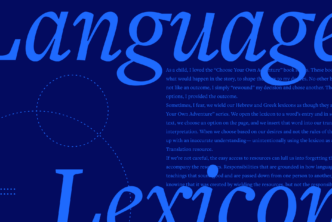One of the things that really fascinated and even awed me after I asked for comments from readers of this Greek email list is that so many of you have taught yourselves Greek.
Now, my experience is not universal, but I judge learning languages on one’s own to be, let’s say, uncommon. When I tell people that I speak Spanish tolerably well, every one of them without exception says, “I took Spanish in high school, but I don’t remember a word of it.” (High school Spanish teachers, could you not at least get hola into their heads?)
I’m in print arguing that the real motivation most people have for learning Spanish, French, German, or Chinese is what sociologists who have studied second-language acquisition call “money.” But knowing Κοινή Greek is unlikely to bring fortune, as I know all too well.
So why do people who are done with school study a language whose native speakers are all so dead? What makes people turn off the TV—a choice that probably ought to be investigated by the House Un-American Activities Committee—and instead pull out a Κοινή Greek grammar book? Why do people learn Greek?
Because God spoke it.
Now I know it’s not quite that simple; I’m an ICBI kind of Christian familiar with the necessary theological distinctions. I know that God didn’t dictate the Bible to scribes but used the personalities and experiences and even the literary proclivities of the Scripture writers. I know that at least in books like Deuteronomy he used an editorial process (Moses didn’t write about his own death and burial). I also know that, as the KJV translators said,
The very meanest translation of the Bible in English, set forth by men of our profession, … containeth the word of God, nay, is the word of God.
Christians do not view the Bible the way Muslims view the Qur’an—as valid only in its original form. English (and Spanish, and French, and German, and Chinese) versions carry God’s authority.
But people who want to get closer to God, to understand him better, sometimes feel an impulse that nothing but the study of Greek (and Hebrew) can fulfill. They are frustrated when the precise import of a particular turn of phrase in Peter’s second epistle eludes them—because what God says matters to them. And they don’t want to teach the Bible to others without the particular kind of confidence that only comes from parsing the participles for yourself.
Luther took Greek and Hebrew so seriously that he said, “We will not long preserve the gospel without the languages”! In a letter “To the Councilmen of All Cities in Germany That They Establish and Maintain Christian Schools,” Luther wrote,
The languages are the sheath in which this sword of the Spirit [Eph. 6:17] is contained; they are the casket in which this jewel is enshrined; they are the vessel in which this wine is held; they are the larder in which this food is stored; and, as the gospel itself points out [Matt. 14:20], they are the baskets in which are kept these loaves and fishes and fragments. If through our neglect we let the languages go (which God forbid!), we shall not only lose the gospel, but the time will come when we shall be unable either to speak or write a correct Latin or German.
Martin Luther, Luther’s Works, Vol. 45 : The Christian in Society II, ed. Jaroslav Pelikan (Philadelphia: Fortress Press, 1999), 360.
I’m wary of claiming too much for Greek and Hebrew, and so is Luther:
A simple preacher (it is true) has so many clear passages and texts available through translations that he can know and teach Christ, lead a holy life, and preach to others. (Ibid., 363)
But Luther’s 500-year-old opinion is still, it seems to me, valid today:
But when it comes to interpreting Scripture, and working with it on your own, and disputing with those who cite it incorrectly…; that cannot be done without languages. (Ibid., 363)
I care about linguistic minutiae in the Greek New Testament, but not as ends in themselves. Sometimes it helps to remind ourselves what our goal is in our work.
New Greek students, remind yourself why you’re slogging.
Experienced exegetes, remind yourself why you slogged.
God has spoken, and it is our privilege and responsibility, we students of the languages, to listen especially closely.
***
If you’re studying on your own and want some help, Learn to Use Biblical Greek and Hebrew is available.





